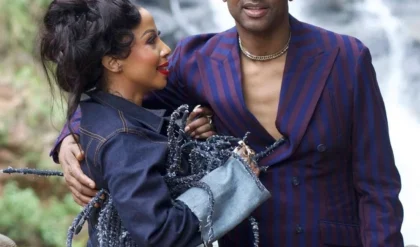In recent years, the line between genuine cultural practices and commercialized or fraudulent interpretations has blurred significantly, leading to heated discussions about tradition, spirituality, and modern influences.
A viral exposé recently brought to light the growing concern about individuals misrepresenting themselves as traditional healers, or “Sangomas,” to gain financial or social leverage. This phenomenon, exacerbated by social media platforms, has sparked debates about authenticity, cultural respect, and the exploitation of traditional African spirituality.
The Erosion of Traditional Authenticity
Traditional healers, known as Sangomas in many parts of southern Africa, historically held revered positions in their communities. They were seen as intermediaries between the physical and spiritual realms, providing guidance, healing, and wisdom. However, the credibility of this practice has been increasingly undermined by a surge of individuals claiming to have spiritual callings without genuine intent or training.

Critics argue that these “pseudo-Sangomas” exploit vulnerable individuals seeking guidance, often using social media as a platform to showcase their so-called abilities. Unlike traditional healers of the past who maintained humble profiles and deep-rooted connections to their communities, many modern claimants appear focused on monetary gains, soliciting payments for prophecies or rituals.
Social Media: A Double-Edged Sword
The role of social media in amplifying this trend cannot be ignored. Platforms such as TikTok, Facebook, and Instagram have given rise to a new generation of self-proclaimed spiritual leaders who broadcast their practices for likes, shares, and financial contributions.
While these platforms have helped preserve and share cultural knowledge with a broader audience, they have also been criticized for trivializing and commodifying sacred traditions.
One notable case involves a high-profile individual who allegedly underwent initiation for wealth rather than spiritual enlightenment. Such claims have drawn skepticism and disdain from the public, with many questioning the authenticity of their practices and the lessons they impart to their followers.
The Reaction: Public Outcry and Religious Reflection
The exposure of fraudulent practices has led to a significant backlash. Many people, particularly those who deeply value traditional spirituality, have voiced their frustrations. Some even express a preference for moving away from traditional beliefs altogether, advocating instead for adherence to religious scriptures like the Bible or Quran.
This shift highlights a broader societal trend of individuals seeking solace and guidance in structured religious frameworks as a reaction to perceived abuses in traditional practices. “If these so-called healers are only in it for personal gain, what hope is there for true spiritual connection?” commented one critic during a recent discussion.
A Call for Discernment
While it’s essential to acknowledge that not all Sangomas or traditional healers are fraudulent, the growing prevalence of impostors has raised important questions. How can communities differentiate between genuine spiritual leaders and opportunists? How can these sacred practices be preserved without succumbing to exploitation?
Experts suggest several measures to address these challenges:
Education and Awareness
- : Educating the public about the proper training and qualifications of authentic Sangomas could help reduce the influence of charlatans.
Community Oversight
- : Strengthening community oversight and peer review systems among traditional healers may improve accountability.
Cultural Preservation
- : Advocates stress the importance of preserving cultural practices in their original form, away from the limelight of social media.
A Broader Cultural Shift
The rise of pseudo-Sangomas reflects a broader cultural shift where traditional values are increasingly subjected to the pressures of commercialization and modernity. While it’s tempting to romanticize the past, it’s also crucial to adapt cultural practices to contemporary contexts without compromising their essence.
Traditional healers of yesteryears were often guided by altruism and a deep sense of community service. Today, the landscape has changed, influenced by the pursuit of wealth, fame, and social media validation. This evolution challenges both practitioners and believers to reassess their roles and responsibilities in maintaining cultural integrity.
The Way Forward
Ultimately, the path forward lies in reclaiming the sanctity of traditional practices while embracing transparency and authenticity.
Genuine healers must rise above the noise of social media to reaffirm their commitment to spiritual guidance and healing. Meanwhile, communities must take collective responsibility for safeguarding their traditions against misuse and ensuring that cultural knowledge is passed down in its truest form.
In the words of one commentator, “This is not just about exposing fraud; it’s about protecting a legacy that belongs to all of us.”
Conclusion
The growing concern over pseudo-traditional practices is a wake-up call for society. It forces a critical examination of how sacred traditions are being portrayed and practiced in a modern, digitized world. While the challenges are significant, the resilience of South African culture and spirituality offers hope for a more respectful and authentic future.
As conversations continue, the focus must remain on educating, preserving, and celebrating the true essence of African spirituality—ensuring it thrives for generations to come.
News
Kelly Khumalo and Arthur Mafokate ‘wedding’: It was new music all along
When images of Arthur Mafokate and Kelly Khumalo started trending on social media a few weeks ago, rumours about a possible romance and a possible marriage between the two musicians spread like wildfire. It was all purely speculative, as no…
‘Mampintsha was never broke’: Babes Wodumo clears the air on lobola claims
‘I can confirm that, as the Simelanes, we received lobola from Mandla and not from Showmax or PAP,’ Babes Wodumo’s manager said. Babes Wodumo and the late Mampintsha. Images: Instagram @viraltrends Award-winning Gqom queen Babes Wodumo has downplayed allegations made…
29-Year-Old Black Entrepreneur Wants to Buy Spirit Airlines to Make it America’s First Black-Owned Commercial Airline
29-year-old entrepreneur Hashim Walters from New Orleans, Louisiana, has officially launched The Latimer Group, an ownership consortium focused on acquiring Spirit Airlines, an iconic brand facing critical financial distress. He says that his mission is to empower African American economic…
What Gogo Maweni Just Did Is So Heart Breaking
The Escalating Drama Between Scoten and Goa: A Deep Dive into a Social Media War In the world of social media, the line between entertainment and personal conflicts often becomes blurred. This is evident in the ongoing drama between two…
SHOCKING 😯 MPUMELELO MSELEKU SHOT AND KIL#ED SOMEONE…||ALLEGEDLY .
The Latest Update on the Controversy Involving Somizi and Mohale In the world of entertainment, the drama surrounding the relationship between Somizi Mhlongo and Mohale Motaung has become one of the most talked-about topics. This couple has consistently been in…
Strange Things About Somizi And Mohale That No One Talks About
Strange Things About Somizi and Mohale’s Relationship That People Never Talk About In the world of South African celebrity gossip, one relationship that has sparked both admiration and speculation is that of Somizi Mhlongo and Mohale Motaung. The two have…
End of content
No more pages to load











